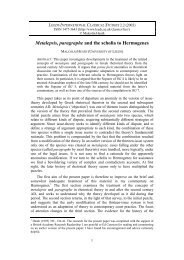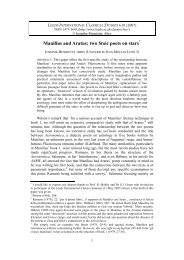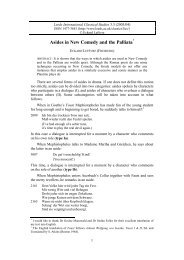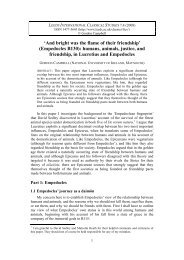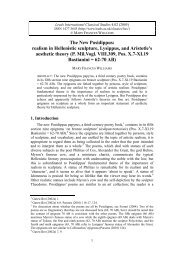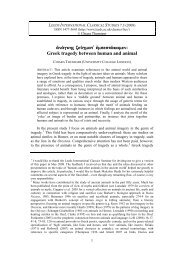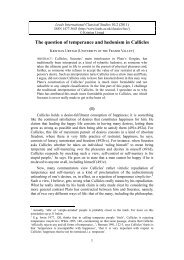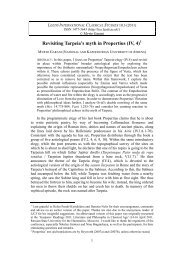Teiresias, the seer of Oedipus the King - Leeds International ...
Teiresias, the seer of Oedipus the King - Leeds International ...
Teiresias, the seer of Oedipus the King - Leeds International ...
You also want an ePaper? Increase the reach of your titles
YUMPU automatically turns print PDFs into web optimized ePapers that Google loves.
HANNA M. ROISMAN, TEIRESIAS, THE SEER OF OEDIPUS THE KING<br />
meaning <strong>of</strong> <strong>the</strong> statement stems from <strong>the</strong> association between physical blindness<br />
and spiritual sight on which Sophocles’ <strong>Teiresias</strong> had played. Sophocles had his<br />
<strong>Teiresias</strong> maintain that his physical blindness conferred on him knowledge <strong>of</strong><br />
hidden truths, while <strong>Oedipus</strong>’ sight <strong>of</strong> <strong>the</strong> physical world was coupled with a basic<br />
ignorance <strong>of</strong> those truths (OT 412-28). Seneca takes <strong>the</strong> paradox out <strong>of</strong> <strong>the</strong><br />
oxymoron <strong>of</strong> <strong>the</strong> ‘blind <strong>seer</strong>’ and presents <strong>the</strong> audience with a <strong>Teiresias</strong> who is not<br />
only unable to see <strong>the</strong> world <strong>of</strong> objects, but whose ability to discern hidden truths<br />
is limited as well. 25 At <strong>the</strong> end <strong>of</strong> <strong>the</strong> scene, <strong>Teiresias</strong> will tell his hearers that his<br />
divining arts will not yield up <strong>the</strong> murderer’s name and that <strong>the</strong> murdered man<br />
must be consulted for that (390-9).<br />
The next two sentences reiterate yet again <strong>the</strong> dual motifs <strong>of</strong> <strong>Teiresias</strong>’<br />
eagerness to help and limited ability to do so. ‘Where my country, where Phoebus<br />
calls, I shall follow’ (sed quo vocat me patria, quo Phoebus, sequar, 296),<br />
<strong>Teiresias</strong> assures <strong>Oedipus</strong>, but <strong>the</strong>n apologizes again, stating that: ‘if my blood<br />
were fresh and warm, I would receive <strong>the</strong> god directly in my heart’ (si foret viridis<br />
mihi/ calidus sanguis, pectore exciperem deum, 297f.). The precise meaning <strong>of</strong><br />
this statement is not entirely clear. Töchterle and o<strong>the</strong>rs have suggested that it<br />
means that if he could, <strong>Teiresias</strong> would discern <strong>the</strong> god’s messages directly by<br />
inspiration instead <strong>of</strong> through divination. 26 Yet whatever its precise meaning, <strong>the</strong><br />
statement conveys clearly enough that <strong>Teiresias</strong>’ old age is not only a source <strong>of</strong><br />
physical weakness but also reduces his ability to ‘see’ as a <strong>seer</strong> should.<br />
The second scene in which we hear <strong>of</strong> <strong>Teiresias</strong> is <strong>the</strong> incantation to Bacchus.<br />
Before leaving <strong>the</strong> stage at <strong>the</strong> end <strong>of</strong> <strong>the</strong> divination scene, <strong>Teiresias</strong> proposes that<br />
Laius be consulted to identify his murderer and that, in <strong>the</strong> meantime, <strong>the</strong><br />
chorus—or ‘folk’—‘chant <strong>the</strong> praises <strong>of</strong> Bacchus’ (401f.). In having <strong>Teiresias</strong><br />
introduce <strong>the</strong> paean to Bacchus, Seneca draws on his role, developed in Euripides’<br />
Bacchai, as <strong>the</strong> <strong>seer</strong> who welcomed Dionysus as a somewhat late-coming god to<br />
<strong>the</strong> Theban pan<strong>the</strong>on. Euripides had depicted <strong>Teiresias</strong> as a worldly-wise priest,<br />
who had <strong>the</strong> perspicacity to accept <strong>the</strong> divinity <strong>of</strong> <strong>the</strong> powerful god <strong>of</strong> <strong>the</strong> vine,<br />
even though <strong>the</strong> ruler <strong>of</strong> Thebes, <strong>the</strong> ra<strong>the</strong>r dour Pen<strong>the</strong>us, had rejected him. 27 The<br />
celebratory tone <strong>of</strong> <strong>the</strong> paean is ra<strong>the</strong>r disconcerting in a play that draws on <strong>the</strong><br />
dark <strong>the</strong>mes <strong>of</strong> plague, incest, and filial murder, and scholars have long debated<br />
Seneca’s purpose in introducing Bacchus. 28 For our understanding here, what is <strong>of</strong><br />
interest is that while Seneca draws on <strong>the</strong> Euripidean figure, he takes nothing from<br />
Euripides’ characterization, for, o<strong>the</strong>r than making <strong>the</strong> proposal, his <strong>Teiresias</strong><br />
plays no role at all in <strong>the</strong> paean. 29<br />
25<br />
For <strong>the</strong> absence <strong>of</strong> <strong>the</strong> imagery <strong>of</strong> ‘seeing’ and ‘knowing’ in <strong>the</strong> Senecan version see also Motto<br />
and Clark (1988) 148f.<br />
26<br />
Töchterle (1994) on line; Häuptli (1983) on line. Cf. Henry and Walker (1983) 135.<br />
27<br />
For a discussion <strong>of</strong> <strong>the</strong> Euripidean <strong>Teiresias</strong> see Roth (1984) and bibliography.<br />
28<br />
Motto and Clark (1988) 158-62 show how <strong>the</strong> ode to Bacchus ties in with <strong>the</strong> unnatural fate <strong>of</strong><br />
many <strong>of</strong> <strong>the</strong> Cadmean family. Dionysus along with Apollo plague <strong>the</strong> Cadmean line, cf. Henry and<br />
Walker (1983) 137f. The underlying irony in <strong>the</strong> ode to Bacchus leads Boyle (1997) 94 to identify<br />
Sophocles Ant. 115-54 as <strong>the</strong> ‘model’ for <strong>the</strong> Senecan choral ode.<br />
29<br />
Mastronarde (1970) 309-11 sees in <strong>Teiresias</strong> <strong>the</strong> reverse <strong>of</strong> Bacchus, and points out that ‘<strong>the</strong>mes<br />
<strong>of</strong> <strong>the</strong> Theban past link <strong>the</strong> necromancy and <strong>the</strong> Bacchus-ode’ (310).<br />
14



